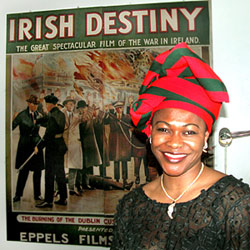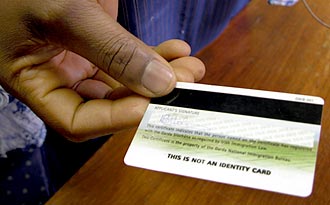|
Rights, Freedoms and Repression
Blog Feeds
The SakerIndymedia Ireland is a volunteer-run non-commercial open publishing website for local and international news, opinion & analysis, press releases and events. Its main objective is to enable the public to participate in reporting and analysis of the news and other important events and aspects of our daily lives and thereby give a voice to people.
Public InquiryInterested in maladministration. Estd. 2005
Human Rights in IrelandIndymedia Ireland is a volunteer-run non-commercial open publishing website for local and international news, opinion & analysis, press releases and events. Its main objective is to enable the public to participate in reporting and analysis of the news and other important events and aspects of our daily lives and thereby give a voice to people.
Lockdown Skeptics
|
Voting Rights for Immigrants in Ireland Under Threat louth |
rights, freedoms and repression |
feature louth |
rights, freedoms and repression |
feature
 Sunday April 11, 2004 02:55 Sunday April 11, 2004 02:55 by Indymedia Ireland Editorial Group - Indymedia Ireland by Indymedia Ireland Editorial Group - Indymedia Ireland
 Bureaucratic Anomaly Could Disenfranchise Thousands of New Voters .
Born in Nigeria and now a resident in Ireland, Ms. Attoh has been a four year resident in Dundalk - she has a legal right to run in the local elections. Ms. Attoh estimates the Dundalk non-EU immigrant population to be over a thousand, ''it would be wrong for any politician in that area to ignore that number.'' If elected, she wants to ''represent everyone, the immigrant community as well as the local population. I want our views [as immigrants] to be respected. That is the reason I decided to run.'' After four years in Ireland she wants to bring her political activism to the Irish political arena. She is one of the first African voices to be heard in Irish elections but disregards her history making: ''The issue here is not to make history, the issue is to make a change, to make a difference.'' ''Back home in Nigeria I was involved in politics, I was a student representative in the university. And after I watched Irish politics keenly I saw so many cowboys and liars that I decided Irish politics could do with an African.'' Ms. Attoh sees great similarities between Irish voters and immigrant voters ''The local issues facing immigrants are the same facing the local Irish population - but are often deeper for the immigrant communities.'' She cites Housing as an example of what affects both Irish and immigrants alike, but still differently for immigrants. ''In a situation where you have 5-8 people in a crowded two bedroom apartment, that is also an issue of homelessness.'' And health services, too ''We have no maternity or paediatric units in the hospitals of Dundalk - you have to travel all the way to Drogheda for pediatric services. This is not acceptable to either local Irish or Immigrants in Dundalk.'' All Dundalk voters will have the chance to vote for Ms. Attoh, but only Irish citizens will be able to vote on the recently announced Mc Dowell Referendum designed to eliminate the right of citizenship to all children born in Ireland. Ms. Attoh sees the Mc Dowell Referendum as a Fianna Fáil/Progressive Democrat attempt to divide voters against Ireland's new residents and citizens: ''We are the targets of this particular referendum. We won't be heard if we are not in office. There has to be some level of representation so that government will listen to us, and that is why a number of us are running in this race.''
''They will not accept the ID's given by the GNIB because on the back of the card it is clearly stated that 'THIS IS NOT AN IDENTITY CARD' - at the moment we are stuck, we do not know what to do. The government says we have the right to vote in local and European elections, but if we go to vote this June 11 they will probably tell us that our ID's are not acceptable.''
Seeking asylum to become a recognised refugee is a log jammed process that can take years. At the start of the process the Department of Justice confiscates the applicants' passport, if he or she has one, and then gives the applicant a Temporary Residence Certificate Card and this card clearly states that it is not be used for identification purposes. On 25 March, Aengus Ó Snodaigh TD (Sinn Féin) tabled a question in Dáil Éireann concerning this anomaly in the system (see below). The question was answered by Martin Cullen TD (Fianna Fáil) Minister for the Environment, Heritage and Local Government, as 'under examination' - eight weeks until the election and no solution has been offered by the government. ''We are asking for an acceptable form of identification so that we may vote.'' Ms. Attoh says. In spite of these difficulties and the current climate of racial division in Ireland, Ms. Attoh is hopeful for the future: ''In 15 years Ireland will be a more hospitable place because the awareness and understanding will have increased in the Irish people and the attitude will not be what it is now.'' Ms. Attoh looks forward to an Ireland of the future that welcomes both Irish and Immigrants. ''We look forward to an Ireland that everyone can call their home.'' |
























 However, the democratic aspirations of Ms Attoh may be dashed since many of her voters will not be allowed to vote this June 11. Asylum Seekers may not be allowed to vote due to a bureaucratic anomaly - the 'ID card' given to all Asylum Seekers by the Garda National Immigration Bureau (GNIB) cannot, by law, be used as identification.
However, the democratic aspirations of Ms Attoh may be dashed since many of her voters will not be allowed to vote this June 11. Asylum Seekers may not be allowed to vote due to a bureaucratic anomaly - the 'ID card' given to all Asylum Seekers by the Garda National Immigration Bureau (GNIB) cannot, by law, be used as identification.
 printable version
printable version

 Digg this
Digg this del.icio.us
del.icio.us Furl
Furl Reddit
Reddit Technorati
Technorati Facebook
Facebook Gab
Gab Twitter
Twitter
View Full Comment Text
save preference
Comments (17 of 17)